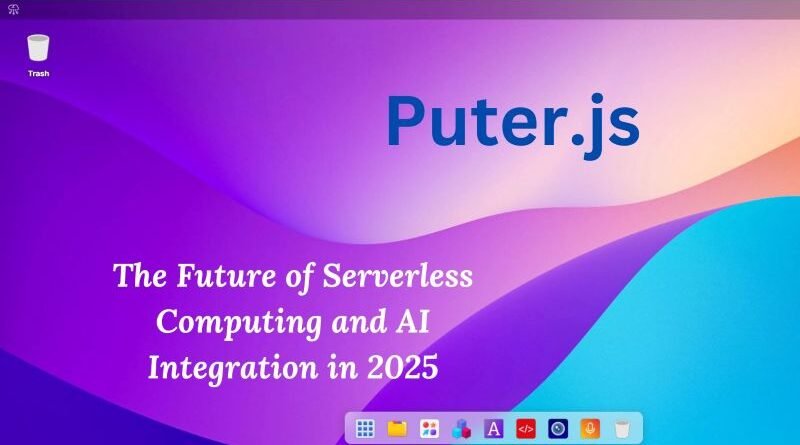Puter.js: The Future of Serverless Computing and AI Integration in 2025
In an era where cloud computing and AI services dominate the tech landscape, Puter.js emerges as a groundbreaking solution, redefining how developers integrate cloud services, AI, and authentication into their applications. The serverless framework is set to reshape the way web applications operate, offering seamless integration, privacy-first architecture, and unparalleled scalability. This article explores the capabilities of Puter.js, its applications, and how it fits into the broader technological landscape of 2025.
What is Puter.js?
Puter.js is a serverless framework that allows developers to access cloud services, AI-powered tools, and user authentication directly from the browser. Unlike traditional backend-heavy architectures, Puter.js operates entirely client-side, eliminating the need for backend configurations or server maintenance. With just a single script tag, developers can access a suite of cloud-based services without needing to set up APIs or manage servers.
The framework provides features such as:
- Authentication: Secure, user-friendly authentication without backend coding.
- Cloud Storage: Decentralized file storage with end-to-end encryption.
- NoSQL Database: Simple and scalable data storage for web applications.
- AI Services: GPT-4-powered chat, DALL-E image generation, and text-to-speech capabilities.
- Privacy-First Design: No data tracking or monetization of user information.
Why Serverless Matters in 2025
Serverless architecture is gaining traction due to its ability to simplify development and reduce operational costs. In 2025, with the rapid growth of IoT devices, edge computing, and AI applications, serverless frameworks like Puter.js are becoming essential. They offer:
- Cost Efficiency: No server maintenance or infrastructure costs.
- Scalability: Automatic scaling based on user demand.
- Security: Built-in authentication and encrypted data storage.
- Faster Time-to-Market: Quick integration with minimal setup.
Key Features of Puter.js
1. Seamless Authentication
Puter.js provides secure, decentralized authentication with support for OAuth, email-based logins, and Web3 wallets. This makes it easier for developers to integrate user authentication without complex backend infrastructure.
2. Cloud Storage with Privacy at Its Core
Unlike traditional cloud storage solutions, Puter.js prioritizes privacy by encrypting data before it leaves the client device. This ensures that only the user has access to their files, offering a more secure alternative to centralized cloud services.
3. AI-Powered Services
With built-in support for GPT-4 chatbots, DALL-E image generation, and text-to-speech services, Puter.js enables developers to integrate AI features directly into their applications. This allows for more dynamic user experiences without relying on third-party APIs.
4. NoSQL Database
Puter.js offers a lightweight, scalable NoSQL database designed for modern web applications. Developers can store and retrieve data directly from the browser without setting up backend infrastructure.
Use Cases of Puter.js
- Decentralized Social Media Platforms: Secure, user-owned data with AI-powered moderation.
- E-Commerce Applications: Serverless shopping carts and product recommendations.
- Educational Tools: Interactive learning apps with AI tutors.
- IoT Device Management: Lightweight dashboards with real-time data updates.
- Content Creation Tools: AI-powered design and writing applications.
Advantages Over Traditional Cloud Services
| Feature | Puter.js | Traditional Cloud Services |
|---|---|---|
| Serverless Architecture | Yes | No |
| Built-in AI Services | Yes | Limited |
| Privacy-First Design | Yes | No |
| Cost Structure | User Pays for Own Usage | Developer Pays for Usage |
| Time-to-Market | Fast | Slower |
Challenges and Future Developments
While Puter.js presents numerous advantages, there are still challenges to address:
- Browser Compatibility: Ensuring consistent performance across all browsers.
- Data Transfer Costs: Managing costs for high-volume applications.
- AI Bias and Ethical Concerns: Mitigating potential biases in AI-generated content.
Future updates to Puter.js are expected to enhance cross-browser support, introduce more AI services, and provide developer tools for ethical AI development.
Conclusion
In conclusion, Puter.js stands at the forefront of the serverless computing revolution, offering developers a powerful, privacy-first framework to build cloud-based applications without the complexities of traditional backend infrastructure. As the demand for decentralized, secure, and AI-powered applications grows, Puter.js is poised to play a crucial role in shaping the future of web development.
Whether you’re an independent developer or part of a larger organization, adopting Puter.js can accelerate your development process, enhance user privacy, and unlock new possibilities for AI-powered applications. The future of computing is serverless, and Puter.js is leading the charge.
